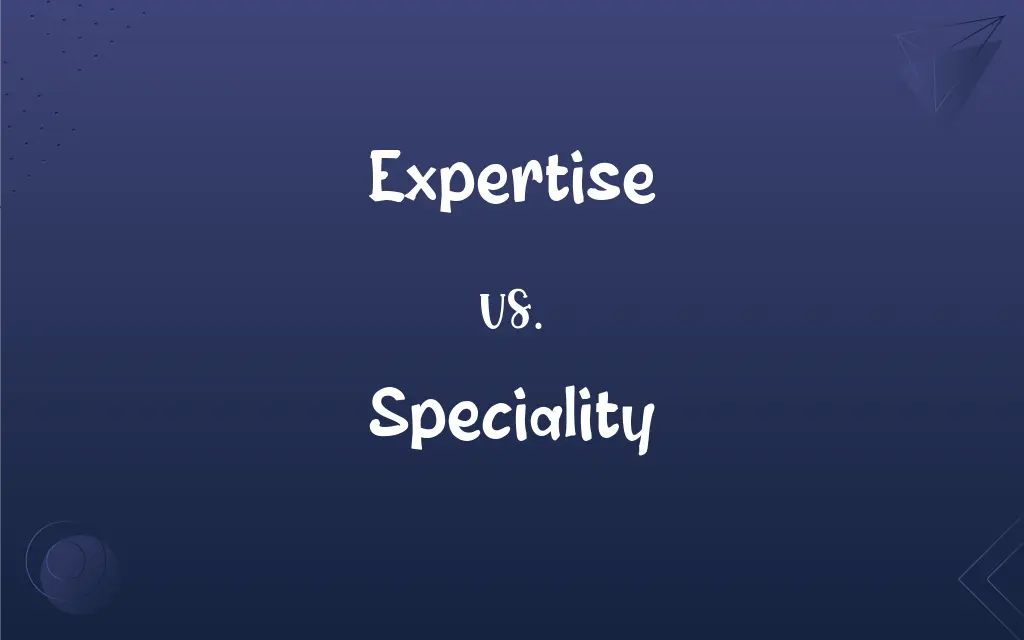Expertise vs. Speciality: What's the Difference?
Edited by Aimie Carlson || By Harlon Moss || Updated on November 6, 2023
Expertise refers to a high level of knowledge or skill in a particular field, while specialty is a field of focus or concentration.

Key Differences
Expertise implies a deep understanding and proficiency in a particular area or discipline, gained through experience or training. It is often demonstrated through the ability to solve complex problems or perform tasks effectively. Speciality, however, is a specific branch of a profession or field that an individual or organization focuses on, potentially becoming an area of expertise with sufficient experience.
An individual can have expertise in multiple areas, indicating that they have a broad set of skills or knowledge that they apply effectively. This person’s speciality is the specific domain within their broader expertise that they may be particularly known for or where they spend most of their time and effort.
Expertise is often recognized through qualifications, experience, and reputation, reflecting a person’s skill level and knowledge base. In contrast, specialty is typically chosen or assigned, reflecting an area of practice or study someone has decided to concentrate on, which may eventually develop into expertise.
Expertise is dynamic and can grow or evolve over time as a person learns and gains experience. It is about how well someone performs in their field. Meanwhile, specialty tends to be more static, referring to the chosen field or area someone is dedicated to, whether or not they have achieved a high level of expertise in it.
For example, a doctor might have expertise in medicine due to their comprehensive knowledge and clinical experience. Their speciality, however, could be cardiology, the area in which they have chosen to concentrate their medical practice and potentially where their greatest expertise lies.
ADVERTISEMENT
Comparison Chart
Definition
Skill or knowledge in a particular area.
A specific field of focus or concentration.
Acquired Through
Experience and learning.
Education and selection.
Flexibility
Can be broad and applicable in various contexts.
More focused and specific.
Measurement
By level of skill and effectiveness.
By the field or subject matter.
Change Over Time
Can develop and change with continued practice.
Often remains the same throughout a career.
ADVERTISEMENT
Expertise and Speciality Definitions
Expertise
The skill of an expert.
His expertise with computer programming is highly sought after.
Speciality
A pursuit, area of study, or skill to which someone has devoted much time and effort and in which they are expert.
Pastry is the chef's speciality, and his desserts are famous.
Expertise
Authority or power coming from the knowledge or practice of a specific thing.
She spoke with expertise about the legal implications of the contract.
Speciality
A branch of medicine or surgery in which a doctor specializes; also the field of academic study.
She's completing her residency in her speciality of pediatric medicine.
Expertise
Profound knowledge or skill in a particular area.
Her expertise in archaeology has won her numerous academic awards.
Speciality
The state of being special, distinct, or noteworthy.
The speciality of this coffee is its unique blend of African and South American beans.
Expertise
Special skill or knowledge acquired by training, study, or practice.
The chef's expertise in French cuisine is unmatched.
Speciality
A product or service that one's business offers which is not offered by most others.
This shop's speciality is hand-crafted, artisanal cheeses.
Expertise
The state of being an expert; proficiency.
His expertise in negotiations often leads to successful outcomes.
Speciality
An area of particular focus, often within a larger field.
His speciality in the field of engineering is renewable energy technologies.
Expertise
Skill or knowledge in a particular area.
Speciality
A distinguishing mark or feature.
Expertise
Great skill or knowledge in a particular field or hobby.
The scientist has expertise in the field of nuclear fusion.
Speciality
Specialities Special points of consideration; particulars.
FAQs
Does speciality change with market trends?
It can, especially if it is a business speciality responding to consumer demand.
Does having a speciality mean you have expertise?
Not necessarily; one can have a speciality without being an expert in it.
Can a speciality also be a hobby?
Yes, if someone devotes much time and effort to it.
Is speciality more about education or practice?
It involves both, but it is often initially chosen through education.
Can expertise be measured?
Yes, typically through assessments of skill and knowledge.
Can expertise be in non-technical fields?
Yes, expertise can be in any field, including arts, crafts, and humanities.
Can one have multiple areas of expertise?
Yes, it is possible to have multiple areas of expertise.
Can specialities be interdisciplinary?
Yes, some specialities can combine aspects of different fields.
Is expertise the same as experience?
Not exactly; expertise denotes a high level of skill or knowledge, which usually comes from experience.
Does speciality always require certification?
In professional fields, it often does, but not always.
Does expertise guarantee success in one's field?
Not guaranteed, but it significantly increases the likelihood of success.
Is expertise recognized globally?
Expertise is generally recognized, but the level of recognition can vary by region.
How is expertise verified?
Through credentials, work history, publications, and sometimes certification.
Is speciality limited to professional contexts?
No, it can refer to any area of focused interest or activity.
What's more valuable, expertise or speciality?
Value depends on context; both have their place and advantages.
Are expertise and speciality mutually inclusive?
They can be, but one does not automatically include the other.
Does having a speciality limit job opportunities?
It can focus job opportunities but also makes one more attractive within a niche.
Can expertise lead to a speciality?
Yes, expertise in a broad field can lead to specializing in a specific part of that field.
Can one's speciality be self-taught?
Yes, one can develop a speciality through self-directed learning.
Can expertise be lost?
Yes, without continual practice and updating of knowledge, expertise can diminish.
About Author
Written by
Harlon MossHarlon is a seasoned quality moderator and accomplished content writer for Difference Wiki. An alumnus of the prestigious University of California, he earned his degree in Computer Science. Leveraging his academic background, Harlon brings a meticulous and informed perspective to his work, ensuring content accuracy and excellence.
Edited by
Aimie CarlsonAimie Carlson, holding a master's degree in English literature, is a fervent English language enthusiast. She lends her writing talents to Difference Wiki, a prominent website that specializes in comparisons, offering readers insightful analyses that both captivate and inform.































































